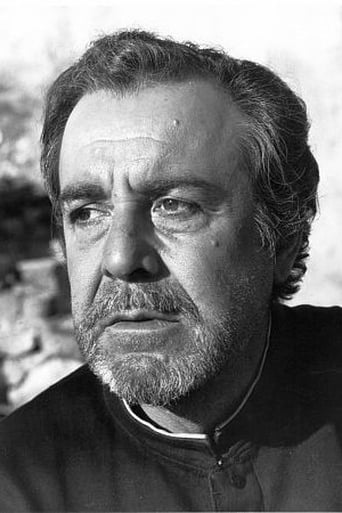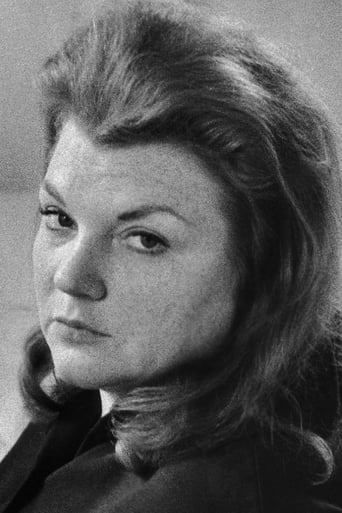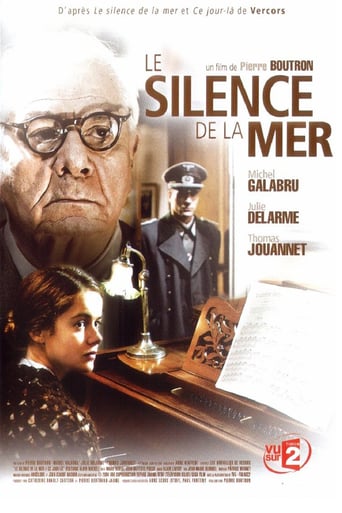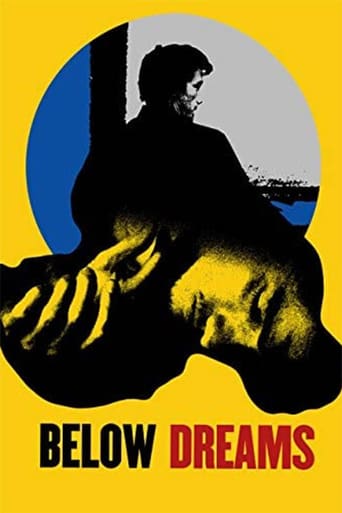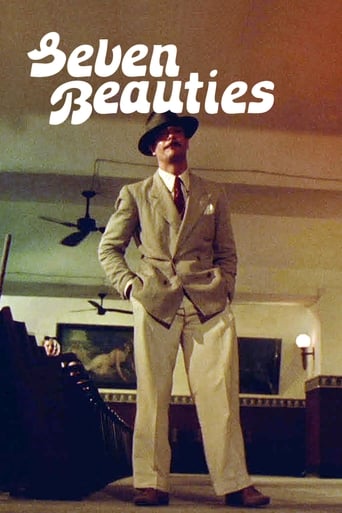
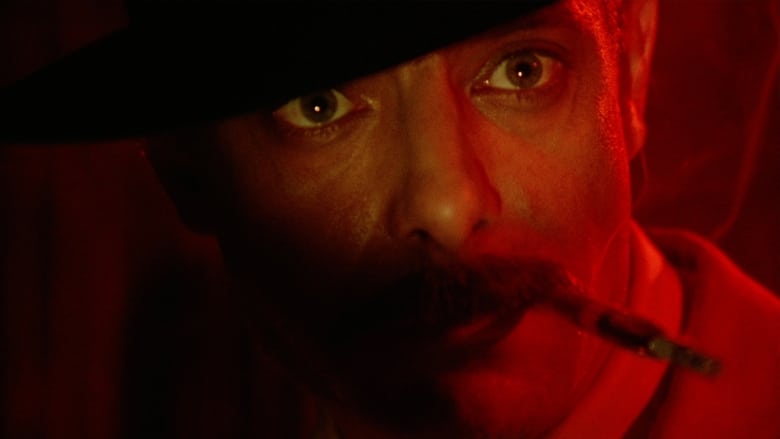
Seven Beauties (1976)
Pasqualino Frafuso, known in Naples as "Pasqualino Seven Beauties" is a petty thief who lives off of the profits of his seven sisters while claiming to protect their honor at any cost, Pasqualino is arrested for murder and later sent to fight in the army after committing sexual assault. The Germans capture him and he gets sent to a concentration camp where he plots to make his escape by seducing a German officer.
Watch Trailer
Cast


Similar titles
Reviews
Lina Wertmuller wrote and directed this motion picture, which was released in 1975. It stars Giancarlo Gianinni as the title character, Shirley Stoler, Fernando Rey, and a host of excellent supporting actresses and actors. The film got Wertmuller the first nomination of a woman as Best Director for the Oscars. Her use of music and silence is brilliant."Seven Beauties" starts with our hero on the lam in Germany, an Italian soldier trying to desert to his home in Napoli. In flashbacks throughout the film, we see episodes of Pasqualino Seven Beauties before the war as a young man with aspirations to the Mob. Through a series of misadventures involving murder and an insane asylum, Pasqualino ends up in the Italian army in Germany, where he promptly deserts. The Germans capture him and send him to a concentration camp. Throughout the film, in flashbacks and in the present, Pasqualino's goal is to live. And he gets his wish. Naturally, much goes on in the years between the Thirties and the Forties, when the film ends. Wertmuller is relentless in her hatred of the Nazis and the Fascists. There is enough polemic in the film to get her point across, but not so didactically that it becomes preachy. Some of the characters clearly have no point but to show the intelligence of socialism or the bravery of honor. But what Pasqualino has to show us is the squalor and degradation of the Nazis.If the purpose of good literature is to show us the development of character, Wertmuller shows it in spades through Pasqualino and his family. The price of staying alive is high.SPOILERS In a flashback the movie shows us Pasqualino, his mother, and his sisters during the Depression before World War II. They live in Napoli, and his mother is widowed, so Pasqualino assumes that the's head of the family. Although they are poor, Pasqualino is very happy. He dresses well, he carries a gun, and he feels respected. His oldest sister, however, is 38, and she feels spinsterhood approaching. She's fat and ugly and has no prospects. She falls for a pimp who tells her he'll make her a star and then he'll marry her. Her goal in life is to feel loved, she falls for his line, and he puts her on stage in a skimpy costume then into a brothel. Prostitution is a metaphor throughout Wertmuller's movie. Pasqualino murders the pimp, disposes of the body, is caught and confesses. Told by his lawyer that his only chance to avoid the death penalty is to plead insanity, Pasqualino refuses, claiming the family's honor is more important. Awaiting trial, however, Pasqualino realizes that life is better than an honorable death, and he begins spouting Il Duce's speeches to his fellow inmates. His lawyer gets him sentenced to treatment in an asylum. Staying alive, too, is a repeating theme in "Seven Beauties." Wertmuller realized that one of the genius ideas of the Nazis was to make us all complicit in their atrocities. Throughout the movie, Pasqualino observes atrocities and remains silent over the objections of others around him. Eventually his silent acquiescence leads to action, as he becomes a participant in the murders of those imprisoned with him. While others choose honorable death, Pasqualino chooses to remain alive. It's not a bargain with the devil. It's not a choice we can blame on others. It's the choice of Pasqualino. To live, he has to prostitute himself to the Nazi camp commandant. "Seven Beauties" is an indictment of the Nazis and all their fellow travelers, but an understanding one. Sergei Eisenstein showed us in "Battleship Potemkin" that the drama lies in individual stories not in masses, and Wertmuller shows us the corruption of all of Germany through the individual story of Pasqualino. The Nazi path is a 12-step program which leads not to recovery and redemption but to the sickness that was the Nazi party. Blind obedience to the Nazis leads to hell. Pasqualino's wish to live was granted, and the Furies will hound him with the living hell of his memories.After you've seen "Seven Beauties," watch "Catch 22" and pay attention to Yossarian's conversation with the old Italian man.For serious students, I recommend reading a short article about Mel Brooks at the US News archives where Brooks says you can't take on monsters like Hitler in a direct manner -- they'll always win if you take them seriously and argue their behavior with them. Hitler was famous for seducing his listeners with his rhetoric. Brooks believes the only way to win against tyrants is to mock them and show how crazy they are. Brooks says he attacks the horror of the holocaust with the only weapon that works - ridicule of the perpetrators. Was Wertmuller mocking the Nazis with "Seven Beauties"?Then contrast Brooks's view with that of Bruno Bettelheim in his essay about "Seven Beauties" called "Surviving." Brooks served in the army in World War II and saw the streams of refugees but not the concentration camps. Bettelheim is, as he put it, one of the all too few survivors of the camps. Bettelheim's view of the film and its comic aspects is one of outrage and disgust. Actually, I'm not sure outrage is strong enough to describe his feeling. He excoriates Wertmuller and everyone who gave the film a good review. I contemplated a meaningful dialogue between Mel Brooks and Bettelheim, but I'm not sure it could have happened, given Bettelheim's experience. He was a professor of psychology at the University of Chicago after his escape to America, and he practiced at a school for emotionally disturbed children. Bettelheim's specialty was treatment of the autistic. Unsurprisingly, he suffered from depression. In 1990 at the age of 86 he committed suicide - he was widowed and suffering from the effects of a major stroke.
I saw this film in the late 70's and ran the entire gambit of emotions while viewing it. I never thought I could laugh at such violence and at the hideous Nazi acts of the concentration camps and at the same time feel like heaving my guts on the theatre floor. I am going to have to track down a DVD of this movie to watch it again.As good as Shindlers list was, I found it pale by comparison to "The seven Beauties". It is a wild ride and I can not recommend this film highly enough.What disturbs me is that I have yet to talk to another person who has seen this movie.And a side note: Madona should be crucified for remaking Swept Away.Charlie
Lena Wertmuller has created a fascinating cocktail, one part anti-war film, one part medieval morality play, one part black comedy, shaken vigorously and poured over plenty of fine acting.If growing up in Fascist Italy doesn't give a young boy a slightly distorted sense of manhood, having your bricklayer father die leaving you the sole male in a family of a mother and seven sisters, made sure of the fact; so we find Pascolino, a handsome but strutting ladies' man who carries a pistol in his belt to "command respect." And so begins a roller coaster of events both comic and tragic that deliver him like so many other young men, into the maw of WW2, completely unprepared to cope with the stupidity and inefficiency of large governments at war, the contempt for both the sacred and the profane, the massacre of civilians unlucky enough to be in the way, the destructions of villages, towns, even entire cities, in short these young men are overwhelmed by the evil that is created from both sides of every war as surely and repetitively as an ocean beach is overwhelmed by the incoming tides.Seven Beauties makes its anti-war thrust accessible like another more famous film, Catch-22, by blurring it's humor into the absurd. When Wertmuller shows us the vapidness of Pascolino's life as he struts around the family business or ghoulishly dismembering a body he killed, I think she is taking a more profound view of human existence than just an anti-war film, by showing us the inconsistencies, follies, and sin that inhabit everyday life, might even be the building blocks of national wars. Pascolino's supposed credo is respect, yet where is the respect in defending your sister's honor, if she is in love with her pimp; of challenging the pimp mano a mano, only to kill him by accident ; of volunteering to fight for his country, as a way to escape from a psychiatric ward; of shooting your friend, to save your own life; of finally returning home from defending your country, to find your seven sisters have become prostitutes? The inevitable question becomes, what is there to respect? Even the representative of authority and control, the prison camp commandant, is swept away by the follies of her own system and the temptations of power, while Pascolino is an Everyman, demonstrating the inevitable folly humankind falls into trying to live apart from God.
There have been many movie made on the subject of the Holocaust or the Jewish ghettos and this one is certainly unique. The ones that I find the most watchable are the ones that look at it from an unusual viewpoint--a way that gives us new insight into the wretchedness and evil. My favorite of these is THE SHOP ON MAINSTREET, though SEVEN BEAUTIES is also an exceptional film about the horrors of the Nazis as seen from an unusual man.Pasqualino (also called "Seven Beauties" in the film) is a slimy amoral Italian man who is totally apolitical and only wants to survive the war. His life, up until the war, is shown in a series of flashbacks. And, he was a pimp who mostly avoided arrest until he killed a man. Then he manages to be sent to a mental asylum and then eventually released to the Italian army. No matter how bad his problems are, this smooth talking jerk manages to survive. However, after deserting (about you'd expect from him), Pasqualino and another deserter are captured and stuck in a hell-hole German death camp. Slimy Pasqualino figures he, too, will soon die unless he does SOMETHING to survive. His plan is to seduce the German lady officer in charge. She is, by the way, the uglies, scariest and most awful "human being" you'll ever see on film. His sex scenes with her, instead of being titillating are almost comical in their repulsiveness. However, Pasqualino gets far more than he bargains for. He DOES survive, but is made a Kapo--a boss of his barracks responsible for selecting men for execution and even performing one himself! It is a tough to watch segment of the movie--seeing just how far this "man" will go to save his own skin.The film is a great study in human nature and evil. As you would expect, this film is NOT ACCEPTABLE FARE FOR KIDS! But, for a mature audience, this is well worth your time. Giancarlo Giannini did a wonderful job in the lead.



